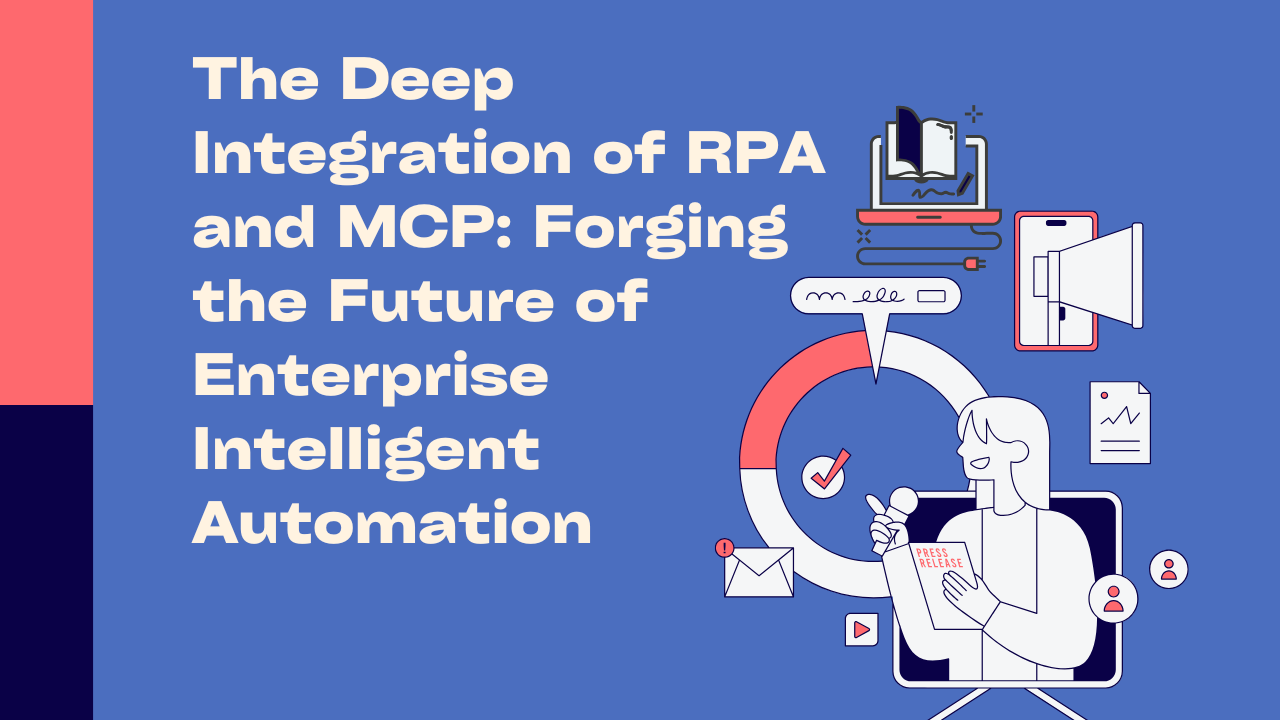The Deep Integration of RPA and MCP: Forging the Future of Enterprise Intelligent Automation
by Bella·
What is MCP?
Managed Cloud Providers (MCP) offer cloud-based solutions that manage and optimize an organization's IT infrastructure. These providers handle everything from data storage and computing power to security and compliance, allowing businesses to focus on their core operations. MCPs are crucial in ensuring seamless integration and scalability of RPA solutions across various business functions.
The Synergy Between RPA and MCP
Combining RPA with MCP creates a powerful duo that enhances business operations through automation and cloud-based efficiencies. Here’s how they work together:
Enhanced Scalability and Flexibility
One of the most significant advantages of integrating RPA with MCP is enhanced scalability. Cloud environments provide the ability to scale RPA efforts up or down based on business demand. This flexibility ensures that businesses can deploy additional bots during peak periods without the need for physical servers. For example, a retail company can quickly scale its RPA operations during the holiday season to manage increased order volumes seamlessly.
Cost Efficiency and Resource Optimization
The synergy between RPA and MCP also translates to cost efficiency. By leveraging cloud platforms, businesses can reduce the overall cost of RPA deployment and maintenance. The pay-as-you-go model of cloud services aligns with the variable cost structure preferred by businesses, allowing them to optimize resources and reduce capital expenditure.
Improved Accessibility and Agility
Cloud-hosted RPA solutions offer improved accessibility, enabling businesses to manage automation across geographically dispersed locations. This accessibility ensures that teams can collaborate and maintain automation workflows from anywhere in the world. Additionally, deploying RPA in the cloud shortens the implementation cycle of automation projects, allowing businesses to respond swiftly to market changes and operational demands.
Practical Applications of RPA and MCP
Finance
In the finance sector, RPA can automate mundane tasks like invoice processing and account reconciliation. MCPs ensure these processes are executed in a secure and compliant cloud environment. For instance, an RPA bot can extract data from invoices, validate it, and update financial records, while the cloud provides a secure repository for this data.
Customer Service
RPA and MCPs enhance customer service by automating order tracking and customer inquiries. RPA bots can handle routine queries, freeing up human agents to focus on complex issues. MCPs provide the infrastructure to manage these interactions at scale, ensuring high availability and reliability.
Human Resources
RPA streamlines HR processes such as payroll and employee onboarding. MCPs offer scalable solutions to manage these processes, ensuring data security and compliance. For example, RPA bots can automate payroll calculations and disbursements, while the cloud stores employee data securely.
IT Operations
In IT operations, RPA can automate software updates and user management tasks. MCPs provide the necessary infrastructure to manage these operations efficiently. RPA bots can execute routine maintenance tasks, while MCPs ensure these processes are performed in a secure and compliant environment.
Real-World Applications and Benefits
Case Study: Synergy's RPA Journey
Synergy, a leading energy provider in Western Australia, serves as a prime example of the successful integration of RPA and MCP. By adopting Automation Anywhere's RPA solution, Synergy automated its billing processes, resulting in a remarkable 163% return on investment (ROI) within 15 months. The initiative reduced error rates by 99% and realized $2.3 million in overall annual value. This success story highlights the transformative power of RPA in streamlining operations and achieving rapid ROI.
Cloud-Enabled RPA in Various Industries
Finance and Accounting: RPA can automate invoice processing, payroll updates, and financial reporting by accessing and processing data stored in cloud-based financial systems.
Customer Service: Automated bots handle routine customer inquiries and requests, such as password resets or account updates, by interfacing with cloud-based customer relationship management (CRM) systems.
Healthcare: RPA bots streamline patient data management, ensuring accuracy and timeliness. This deployment not only improves operational efficiency but also enhances patient care by providing medical staff with immediate access to up-to-date patient information.
Overcoming Challenges with Cloud RPA
While the benefits of cloud-enabled RPA are substantial, businesses must address certain challenges to fully realize its potential. Key considerations include:
Data Security and Compliance: Ensuring robust security measures and adhering to regulatory requirements is crucial. Cloud providers often offer advanced security protocols to protect sensitive data.
Managing Bot Performance: Continuous monitoring and analysis of bot efficiency, task completion rates, and error rates are essential for optimizing RPA processes.
Strategic Vendor Selection: Choosing the right cloud and RPA vendors is pivotal. Organizations must assess vendors based on their ability to provide scalable, secure, and compliant cloud infrastructures alongside robust RPA tools.
The Future of RPA and MCP Integration
The future of RPA and MCP integration looks promising, with advancements in artificial intelligence (AI) and machine learning (ML) technologies continuing to expand the scope of automation. Intelligent automation ecosystems that combine RPA with AI and ML enable bots to perform more complex, cognitive tasks. This evolution opens up new possibilities for transforming business processes and driving innovation.
Conclusion
Robotic Process Automation and Managed Cloud Providers are a powerful combination that can transform business operations. By automating routine tasks and leveraging the efficiencies of the cloud, businesses can enhance productivity, reduce costs, and improve compliance. As digital transformation continues to evolve, the synergy between RPA and MCP will play a crucial role in driving innovation and growth.
